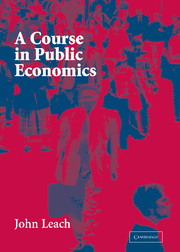Book contents
- Frontmatter
- Contents
- List of Figures
- Preface
- 1 Introduction
- Markets
- Externalities
- Public Goods
- Imperfect Competition
- Taxation and Efficiency
- Asymmetric Information and Efficiency
- 19 Asymmetric Information
- 20 Preference Revelation
- 21 Regulation of a Natural Monopoly
- 22 Other Examples of Asymmetric Information
- Asymmetric Information and Income Redistribution
- A Note on Maximization
- References
- Index
19 - Asymmetric Information
from Asymmetric Information and Efficiency
Published online by Cambridge University Press: 06 July 2010
- Frontmatter
- Contents
- List of Figures
- Preface
- 1 Introduction
- Markets
- Externalities
- Public Goods
- Imperfect Competition
- Taxation and Efficiency
- Asymmetric Information and Efficiency
- 19 Asymmetric Information
- 20 Preference Revelation
- 21 Regulation of a Natural Monopoly
- 22 Other Examples of Asymmetric Information
- Asymmetric Information and Income Redistribution
- A Note on Maximization
- References
- Index
Summary
People search for relevant information but they can never get it all. A commodity trader's decision to buy or sell grain futures hinges upon his prediction of the size of the grain harvest. The trader could improve his prediction if he knew next month's weather, but he can't get this information today at any cost. His uncertainty about next month's weather won't be resolved until next month, when it will be resolved for every trader.
This kind of uncertainty – uncertainty shared by every market participant – isn't fatal to the efficiency of the marketplace, and indeed there are many market transactions that occur simply because this kind of uncertainty exists. There would, for example, be no insurance markets and no futures markets if there were no shared uncertainty.
By contrast, uncertainty that is not shared by all participants can lead to significant inefficiencies. Situations in which some people know things that others do not are said to involve asymmetric information, and these situations give rise to two problems, adverse selection and moral hazard.
Adverse selection occurs when people must decide whether to accept a contract. Suppose, for example, that a firm employing 200 people must lay off 20 of them. It might do so by announcing a severance package and permitting the first 20 volunteers to take the package. A firm making this kind of offer is hoping for a form of self-selection that will minimize the burden of the lay-offs on its employees.
- Type
- Chapter
- Information
- A Course in Public Economics , pp. 293 - 303Publisher: Cambridge University PressPrint publication year: 2003



